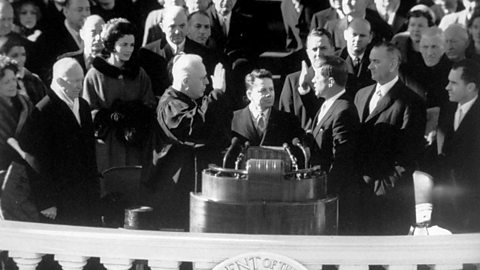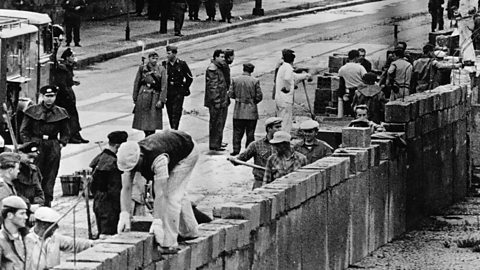The Berlin Wall

John F Kennedy took office in January 1961 bringing with him an uncompromising attitude towards the Soviet Union and international communismA classless society where all property is owned publicly..
At the Yalta ConferenceA meeting of Churchill, Stalin and Roosevelt in 1945, where they planned the warÔÇÖs end, the division of Germany into occupation zones and how post-war Europe should be organised. of 1945, Germany, and its capital Berlin, were both divided into four zones of occupation.
Berlin lay well inside the Soviet zone of occupation and was a source of tension throughout the Cold War. This had first become apparent in 1948 with the crisis over the Berlin BlockadeOne of the first Cold War crises when the Soviet Union blocked the Allies access to West Berlin in 1948. It ended in 1949 after daily western airlifts of supplies to their zones made continuing the Blockade pointless.
On 13 August 1961, the Soviet authorities in East Germany sealed off East Berlin by constructing a huge barbed wire barrier. This was soon replaced by a concrete wall, complete with lookout towers and armed guards who had orders to shoot anyone trying to cross into the Western sector.
Why was the Berlin Wall built?
The Brain Drain

Throughout the 1950s thousands of East German citizens had fled through Berlin for the West, leaving behind the harsh political climate and economic misery of life under communism. Many of those who defectMoving from one area to another, normally because of a preference for a way of life or political beliefs. Eg people defected from East to West Germany were educated or highly skilled workers and the East German authorities could not afford to lose their best and brightest citizens.
Lure of the West
During the 1950s travel was relatively easy between the Eastern and Western sectors of Berlin. People living under communism in the Eastern sector could visit the West and see for themselves what capitalismAn economic system based on privately owned, as opposed to state-controlled, businesses and the creation of profit. could offer. There was decent housing, shops full of goods to buy and relative freedom: all provided by the Western Allies. Many East Germans voted with their feet and this was an embarrassment for the communist authorities.
Espionage
Berlin was a Western island in a communist sea ÔÇô an ideal place for American spies to gather intelligence on the Soviet military.